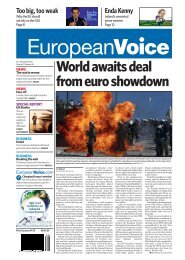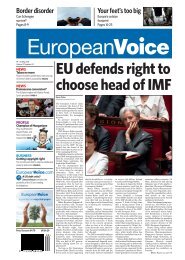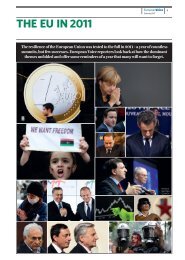special report - European Voice
special report - European Voice
special report - European Voice
You also want an ePaper? Increase the reach of your titles
YUMPU automatically turns print PDFs into web optimized ePapers that Google loves.
CROATIA<br />
30 May 2013<br />
17<br />
REUTERS<br />
Government<br />
loses its grip<br />
The Social Democratic Party will lead Croatia into the EU,<br />
but it has lost support at national and local level, writes<br />
Toby Vogel<br />
For much of the country’s<br />
two decades of independence,<br />
Croatia’s politics has<br />
been dominated by the conservative<br />
Croatian Democratic<br />
Union (HDZ). The<br />
current coalition government,<br />
which ousted the previous<br />
HDZ administration<br />
from power in December<br />
2011, is only the second in<br />
Croatia’s post-independence<br />
history that does not include<br />
the HDZ.<br />
Led by the Social Democratic<br />
Party (SDP) – successor<br />
to Tito’s League of Communists<br />
– of Prime Minister<br />
Zoran Milanović, it also includes<br />
four ministers from<br />
the Croatian People’s Party<br />
(HNS), led by Foreign Minister<br />
Vesna Pusić, one from<br />
the Istrian Democratic<br />
Assembly (IDS), a regional<br />
party, and two without party<br />
affiliation. The government<br />
may be unpopular because<br />
of tough austerity measures<br />
and a sluggish economy, but<br />
it appears stable and is expected<br />
to last until the next<br />
general election, scheduled<br />
for December 2015.<br />
However, recent elections<br />
have suggested a high level<br />
of dissatisfaction with the<br />
SDP. In elections to the<br />
<strong>European</strong> Parliament on 14<br />
April, the HDZ won six of<br />
the country’s 12 seats, doubling<br />
the share it had among<br />
Croatia’s observer MEPs,<br />
while the SDP fell from six to<br />
five seats. Turnout was just<br />
20.75% – the lowest ever in<br />
any election in Croatia, and<br />
one of the lowest in any<br />
member state in elections to<br />
the <strong>European</strong> Parliament.<br />
Local elections on 19 May<br />
brought no relief, with the<br />
HDZ dominating the SDP in<br />
many of the country’s larger<br />
cities. Next Sunday (2 June),<br />
a second round of elections<br />
will be held in the country’s<br />
four largest cities – Zagreb,<br />
Split, Osijek and Rijeka.<br />
Particularly bitter for the<br />
SDP will be its expected failure<br />
to recapture the office of<br />
mayor of the capital, after its<br />
candidate, health minister<br />
Rajko Ostojić, trailed badly<br />
in the first round. Since<br />
2000, this post has been<br />
held for most of the time by<br />
Milan Bandić, a former leading<br />
member of the SDP, who<br />
was expelled from the party<br />
when he stood (and lost)<br />
against Ivo Josipović, the<br />
party’s official candidate, in<br />
the January 2010 presidential<br />
election. Allegations of<br />
corruption and irregularities<br />
have dented Bandić’s image<br />
as a hands-on problemsolver.<br />
Nevertheless, he<br />
appears poised to win reelection<br />
on Sunday.<br />
Bandić is also expected to<br />
be able to forge a centreright<br />
coalition with the HDZ<br />
and other parties to form a<br />
majority in the city assembly.<br />
(Mayors are elected directly<br />
at the same time as city or<br />
municipal assemblies.) The<br />
SDP’s bids to win Split and<br />
Osijek also appear doomed<br />
to fail. Tomislav Karamarko,<br />
the HDZ leader, feels vindicated<br />
in his policy of returning<br />
the party toward the<br />
right end of the political<br />
spectrum.<br />
Perhaps the biggest blow<br />
early in the current government’s<br />
term came at the end<br />
of last year, when Radimir<br />
Cačić, its most powerful<br />
member after Milanović, was<br />
forced to resign as deputy<br />
prime minister and minister<br />
of economy following his conviction<br />
for causing a fatal car<br />
crash in Hungary before becoming<br />
minister. A construction<br />
entrepreneur, Cačić,<br />
a prominent leader of<br />
Pusić’s HNS, had also been<br />
minister of public works in<br />
the SDP -led government of<br />
2000-03. He was seen as a<br />
close associate of Milanović<br />
in a way that Pusić is not.<br />
Presidency<br />
Ivo Josipović is Croatia’s<br />
third post-independence<br />
president, and his low-key<br />
manner signals a shift in the<br />
presidency’s powers. Croatia<br />
changed its constitution following<br />
the death of Franjo<br />
Tudjman at the end of 1999,<br />
abandoning the presidential<br />
semi-authoritarianism of<br />
the 1990s. But Tudjman’s<br />
successor, Stipe Mesić, who<br />
had left the HDZ in protest<br />
against Tudjman’s policies,<br />
was not one to shy away<br />
from seeking to influence<br />
politics. It is only now, with<br />
the soft-spoken Josipović,<br />
that the presidency has become<br />
largely ceremonial.<br />
Josipović was elected in January<br />
2010 and the next presidential<br />
election is scheduled<br />
for February 2015.<br />
Once bitten, twice shy<br />
The EU claims to have learnt the lessons of the 2007<br />
enlargement, but the legacy of the war with Serbia has<br />
hung over Croatia’s accession process, writes Andrew<br />
Gardner<br />
When the <strong>European</strong> Commission<br />
published its last<br />
<strong>report</strong> on Croatia’s accession<br />
process in March,<br />
the message was unequivocally<br />
that the changes<br />
wrought over the eight<br />
years since the country<br />
began negotiations with<br />
the EU were irreversible.<br />
The EU should not be worried<br />
about this new member<br />
state.<br />
Its conclusion is buttressed<br />
by the contention<br />
that it has learnt lessons<br />
from the EU’s enlargement<br />
to Romania and Bulgaria,<br />
particularly about<br />
the importance of starting<br />
to tackle the trickiest issues<br />
for candidate countries<br />
early in the process<br />
and closing them only at<br />
the end. (The experience<br />
of dealing with Croatia has<br />
reinforced the lesson:<br />
chapters 23 and 24 – on<br />
the judiciary and fundamental<br />
rights, and on freedom<br />
and security – are<br />
now opened with subsequent<br />
candidates at the<br />
start of talks and closed<br />
last.) An extended period<br />
of pressure on Croatia<br />
means that the Commission<br />
is very confident that<br />
corruption and the rule of<br />
law will not become a<br />
headache.<br />
On the political level, the<br />
climate has also changed,<br />
with little of the pressure<br />
to bring Croatia into the<br />
EU swiftly that was evident<br />
in the case of the 2007 enlargement.<br />
This has made<br />
for a slower, lower-key<br />
process for Croatia, with<br />
the main risk from adverse<br />
public opinion being in<br />
Croatia rather than in EU<br />
member states.<br />
Nonetheless, Croatia’s<br />
path to the EU was thorny<br />
– because other EU member<br />
states have been prickly.<br />
In the latter stages, German<br />
doubts may have been<br />
the most visible, but the<br />
Dutch have been the most<br />
consistently wary. The<br />
hard line taken by the<br />
Dutch reflects a recent<br />
generalised hostility to<br />
enlargement. But it also<br />
reflected a principled concern<br />
that Croatian governments<br />
were unwilling to<br />
send two generals – Ante<br />
Gotovina and Mladen<br />
Markač – to the International<br />
Criminal Tribunal<br />
for the former Yugoslavia<br />
to face war-crimes charges<br />
over the conflict with Serbia.<br />
As a result, talks began<br />
only after Gotovina was<br />
captured and transferred<br />
to The Hague in 2005.<br />
The two men were eventually<br />
acquitted in November,<br />
to much jubilation in<br />
Croatia. For many Croats,<br />
the issue of war crimes became<br />
a matter of two men<br />
– who had been duly<br />
cleared. But as Vesna Pusić,<br />
Croatia’s foreign minister,<br />
commented at the<br />
time, the verdict did not<br />
81<br />
Rank in Global Competitiveness<br />
Index 2012-13<br />
(out of 144)<br />
clear others already found<br />
guilty of crimes.<br />
The legacy of the war<br />
had been a running sore in<br />
relations with the EU since<br />
accession talks began in<br />
2003, and while issues related<br />
to war crimes did not<br />
feature in the final to-do<br />
list given to Croatia by the<br />
Commission, details in the<br />
final progress <strong>report</strong> hint<br />
at some of the previous<br />
problems. War-crimes cases<br />
were addressed by<br />
courts in the areas where<br />
the crimes were alleged to<br />
have taken place – an approach<br />
unlikely to convince<br />
the victims or ensure<br />
speedy processes. Only recently<br />
have cases been<br />
passed to <strong>special</strong>ised<br />
courts.<br />
Political scandals<br />
Croatia also had to battle a<br />
perception of corruption<br />
created by a string of scandals,<br />
including the killing of<br />
the daughter of a prominent<br />
lawyer in 2008. The<br />
then prime minister, Ivo<br />
Sanader, suggested the<br />
murder was the work of the<br />
mafia and sacked two ministers.<br />
Sanader himself, the<br />
premier between 2003 and<br />
2009, was later convicted<br />
of corruption and is serving<br />
a ten-year sentence.<br />
Perhaps unsurprisingly,<br />
Croats have a low view of<br />
their political and business<br />
elite. Croatia ranked only<br />
62nd in the world for<br />
transparency in a survey<br />
by Transparency International<br />
in 2012.<br />
But those perceptions<br />
47<br />
Rank in Human Development<br />
Index 2012<br />
(out of 187)<br />
perhaps need re-touching.<br />
The Commission thinks so:<br />
it points to hundreds of<br />
convictions in recent years<br />
as an indication that anticorruption<br />
institutions<br />
have put down roots. The<br />
effort has been reinforced<br />
since January by the creation<br />
of a conflict-of-information<br />
commission that<br />
has already ensnared some<br />
politicians. Prime Minister<br />
Zoran Milanović, who<br />
served under Sanader in<br />
the foreign ministry many<br />
years before he became<br />
Sanader’s political rival,<br />
suggests that Sanader’s<br />
trial is testament to<br />
the system’s willingness to<br />
reform itself.










